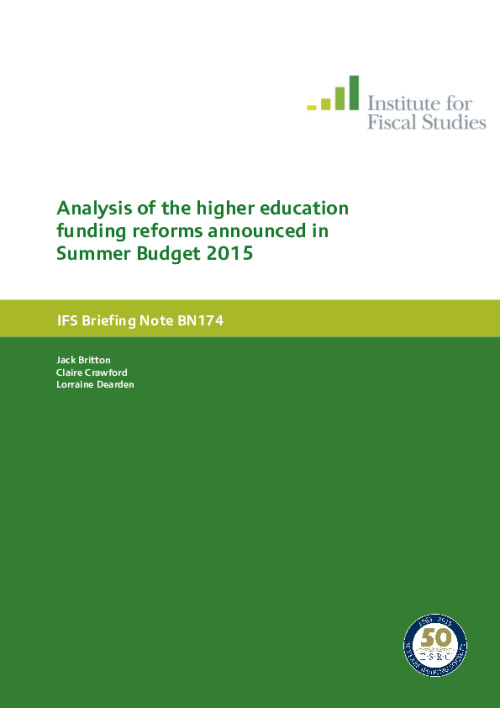Downloads

BN174.pdf
PDF | 508.5 KB
In the Summer Budget of 2015, the Chancellor announced some further changes to higher education funding and student support. This briefing note assesses each of these reforms in turn. The authors start by providing a brief overview of the model underlying our estimates. Next they discuss the implications of the removal of maintenance grants for students and the government, followed by the likely implications of the proposed changes to the repayment threshold, fees and the discount rate, which will all be subject to public consultation. The note ends with some brief conclusions.
Authors

Lorraine Dearden

Research Fellow University College London
Claire is a Research Fellow at IFS, working on the determinants and consequences of participation in childcare and education for parents and children.

Associate Director
Jack's main interests lie in human capital accumulation and discrete choice dynamic modelling.
Report details
- DOI
- 10.1920/BN.IFS.2015.00174
- ISBN
- 978-1-909463-96-7
- Publisher
- Institute for Fiscal Studies
Suggested citation
J, Britton and C, Crawford and L, Dearden. (2015). Analysis of the higher education funding reforms announced in Summer Budget 2015. London: Institute for Fiscal Studies. Available at: https://ifs.org.uk/publications/analysis-higher-education-funding-reforms-announced-summer-budget-2015 (accessed: 27 April 2024).
More from IFS
Understand this issue

Scottish Budget 2024-25: IFS analysis

Sure Start achieved its aims, then we threw it away
15 April 2024

Public investment: what you need to know
25 April 2024
Policy analysis

The short- and medium-term impacts of Sure Start on educational outcomes
9 April 2024

Sure Start greatly improved disadvantaged children’s GCSE results
9 April 2024

What you need to know about the new childcare entitlements
28 March 2024
Academic research

Higher Education Access and Funding: challenges and policy options

6th World Bank/IFS/ODI Public Finance Conference | Driving Progress: Public Finance and Structural Transformation

Labour market inequality and the changing life cycle profile of male and female wages
15 April 2024